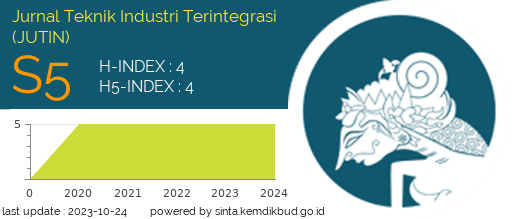Strategi Pengembangan Produk Unggulan Daerah pada Usaha Tempe dengan Metode SWOT dan QSPM
DOI:
https://doi.org/10.31004/jutin.v7i1.23769Abstract
Tempeh is a typical Indonesian food that is rich in benefits, affordable, and accepted internationally. The objectives of this research are: 1). Identify various internal and external factors that influence the development of the tempe business and propose development strategies to maintain its sustainability. Using the Fishbone Diagram to identify and analyze the causes of a factor, followed by applying 2 analytical methods, namely: 1). SWOT analysis, and 2). QSPM analysis. The research results show that based on the IE Analysis and SWOT Analysis, the position of the Sumber Makmur tempeh business is in quadrant I, which means that the business can seize existing opportunities by making maximum use of its strengths. The strategy that must be implemented now is to support aggressive growth policies (Growth Oriented Strategy). In the QSPM Analysis, the highest TAS results are found in alternative quality improvement strategies at low and affordable prices in order to meet high needs and gain public recognitionReferences
Ginting, E., Antarlina, S. S., & Widowati, S. (2009). Varietas unggul kedelai untuk bahan baku industri pangan. Jurnal Litbang Pertanian, 28(3), 79-87.
Harjana, D. (2017). Kandungan Nutrisi Tempe dan Manfaatnya untuk Kesehatan. 2017.
Kusnadi, E. (2011). Fishbone Diagram dan Langkah-Langkah Pembuatannya. 1–5.
Murwanti, S., & Sholahuddin, M. (2015). Analisis Perilaku dan Strategi Pengrajin Tempe dalam Menghadapi Fluktuasi Harga Kedelai. University Research Colloquium, 46–85.
Prasetyo, E. D. (2017). Kajian Home Industry Tempe Ditinjau dari Modal Ekonomi dan Tenaga Kerja di Desa Sepande Kecamatan Candi Kabupaten Sidoarjo. Mahasiswa S1 Pendidikan Geografi, Fakultas Ilmu Sosial Dan Hukum, Universitas Surabaya.
Purwono, J., Sugyaningsih, S., & Putri, Tama, R. (2015). Strategi Pengembangan Bisnis Rumah Tempe Indonesia di Kota Bogor, Propinsi Jawa Barat. Jurnal NeO-Bis, 9(1), 60–71.
PUSIDO Badan Standardisasi Nasional. (2012). Tempe?: Persembahan Indonesia untuk Dunia. In Badan Standardisasi Nasional. https://doi.org/10.1201/9781351074001-6
Sunyoto, Sujiantoro, H., & Yoserizal, Y. (n.d.). Penguatan Usaha Melalui Aplikasi Teknologi Tepat Guna Bagi Kelompok Pengrajin Tempe. PEDULI - Jurnal Ilmiah Pengabdian Pada Masyarakat, 1(2), 54–64.
Tjahjani, I. K., Hatta, M., & Wahyudi, A. (2011). Strategi Mempertahankan Eksistensi Batik Tulis Kampoeng Jetis Dengan Peningkatan Daya Saing dan Kemandirian Para Pengrajin. 1–5.
Wirakusumah, A. T. (2018). OPINI?: Catatan Akhir Tahun untuk Industri Manufaktur. Bisnis.Com, 1–3.
Downloads
Published
How to Cite
Issue
Section
License
Copyright (c) 2024 Mochammad Hatta, Ida Kusnawati Tjahjani

This work is licensed under a Creative Commons Attribution-ShareAlike 4.0 International License.



